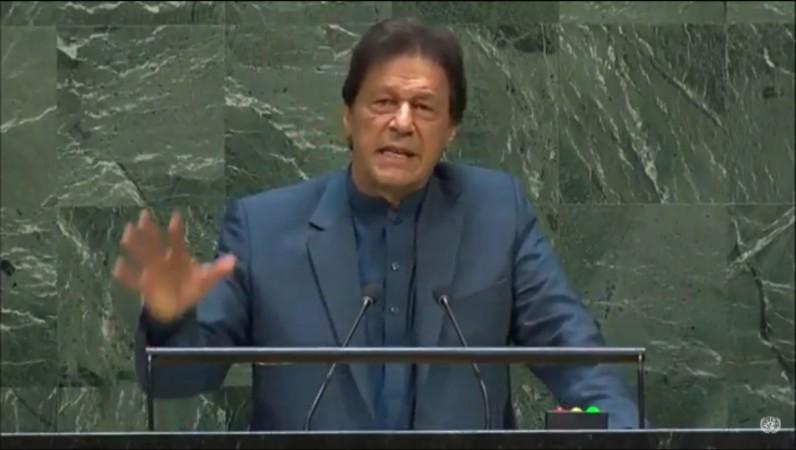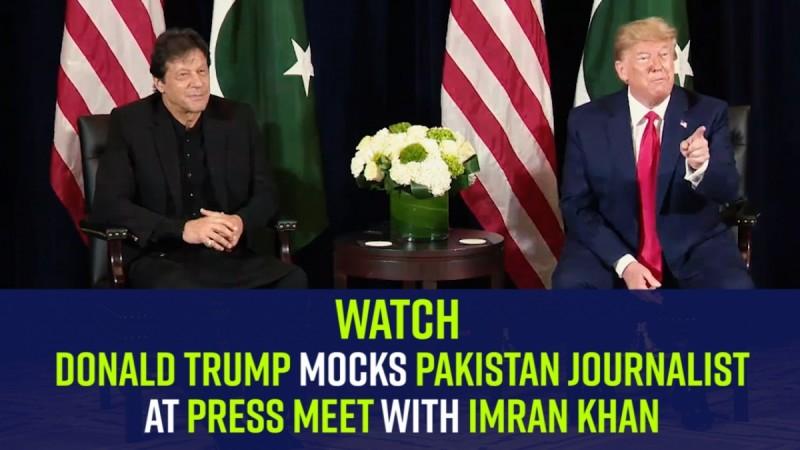
Pakistan Prime Minister Imran Khan on Friday held out threats of a conventional war between the two nuclear-armed neighbours spinning out of control and the radicalisation of Muslims in India and around the world in his address to the General Assembly.
Khan painted a chilling picture of bloodshed and terrorism as he attacked India in his extempore speech that lasted more than the 15 minutes allotted to him.
It was mostly a repetition of his speeches elsewhere this week.
Imran Khan spoke after the two speakers who followed Prime Minister Narendra Modi.
His speech was backwards-looking, focusing on his nation's problems and raising the spectre of war and was a contrast to Modi's.
Modi spoke of his country's achievements and its inspiration to the world for the development and the possibilities of the future, with just one mention of the world uniting against terror.
Giving his scenario for war, Imran Khan said that when the "curfew" is lifted in Kashmir there will be a bloodbath.
People will be out in the streets and the troops "will shoot them", he said.

Kashmiris will be further radicalised and he predicted there will be another Pulwama.
Pakistan will be blamed for the reactions if a conventional war starts between the two nuclear-armed countries, anything can happen when a country faces one seven times its size, he said.
"There is no God but one" and "we will fight to the end," he said as some in the gallery cheered and clapped.
Outside the UN, several thousand demonstrated on behalf of Pakistan and against India as he spoke.
Speaking of human rights violations and possible reactions to the aftermath of the lifting of restrictions in Kashmir, Imran Khan asked: "What do you think Muslims will think? What will be their response?"
Muslims in India will be radicalised, and they (India) will blame Pakistan for it, he asserted.
Moreover, someone among the world's 1.3 billion Muslim will act, he said hinting at mass terror as he cited a movie set in America where a man who was mugged goes around killing people in his rage.
He said that India had said that 500 terrorists were at the border, waiting to cross over and asked what would they do against 900,000 troops.
He said that India will use the "mantra" of "radical Islam" and the world will turn away.
He said that world was not acting because of India's market of 1.2 billion people and nations were putting markets above people.
India should lift the "curfew" and let the political prisoners and 2,000 detained "boys" go, he said.
The UN should act immediately to end the lockdown in Kashmir and then get the people of Kashmir their right to self-determination, he added.
Imran Khan also alleged that India was involved in stoking terrorism in Balochistan and claimed that Kulbhushan Jadav, a former Indian Navy officer captured on the Iran border by Pakistan had confessed to aiding terrorists.
In his speech mixing threats and excuses, he defended the action by Muslims against Salman Rushdie for his novel "Satanic Verses" and attacks on those who lampoon or criticise his religion.
He said that the west did not understand the sentiments of the Muslim people and the regard they had for their prophet and accused it of Islamaphobia.
He launched a vicious attack on the RSS saying it was inspired by Hitler and Mussolini and "Aryan" and Hindu supremacy.
This was the ideology that inspired the BJP and Prime Minister Narendra Modi, he said.
Khan said that he had reached out India for talks and a reset in relations, but was repeatedly rebuffed.
India has refused to talk to Pakistan unless it ends its support for terrorism.
Imran Khan also tried to link radical religiosity to Hinduism by trying to paint the suicide bombers of Tamil Tigers of Sri Lanka as Hindu religion-based terrorists, when in fact they were ethnic with many Christians in their leadership. The organisation's sea force chief was Soosai and its international spokesperson was Anton Balasingham, among the many Christian leaders of an ethnicity-based organisation.









